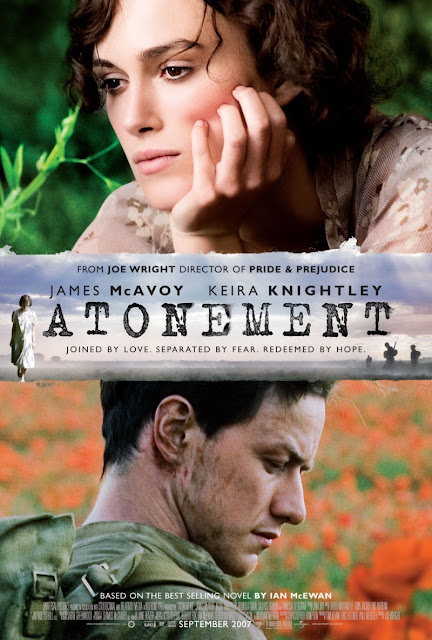Welcome back to the Oscar Film Journal here at Enuffa.com! We're only six days away from this year's ceremony, so let's get back on track and examine some more Best Picture nominees....
Today it's the 2007 period/war/romance/metafiction drama Atonement, starring Keira Knightly, James McAvoy, Saoirse Ronan, Juno Temple, and Benedict Cumberbatch, a veritable who's who of future English stars. Atonement was directed by Joe Wright and based on the acclaimed Ian McEwan novel, the story of how a single malicious lie can cause a ripple effect that destroys lives. Without giving too much away, the film begins at a 1930s English country house, where the family's youngest child Briony witnesses what she thinks is an inappropriate sexual episode between her older sister Cecelia and her love interest Robbie, their housekeeper's son. This misunderstanding leads to Briony's conclusion that Robbie is some kind of sexual deviant and she later lies to the authorities about a subsequent rape accusation, with dire consequences.
I don't want to divulge more than that, which does make it difficult to discuss what a visually and narratively inventive film this is. We see two events occur both from Briony's uninformed point of view and then from Cecelia and Robbie's, illustrating how easily things can be misconstrued when one doesn't have all the facts. This allows us to empathize with Briony's naive viewpoint even though she's jumping to conclusions with neither the full information nor an understanding of complex adult relationship dynamics. At the same time we're able to grasp just how harmful her lie is, because the true version of the events in question shows us the tender innocence of Cecelia and Robbie's budding romance. Thus the eventual repercussions of Briony's actions are that much more heartbreaking.
The cinematography by Seamus McGarvey is stunning, immersing us in the family's lush country estate in the first act and the austerity of war-torn France in the second. The film's master shot is a five-and-a-half-minute unbroken take where we follow a character from an empty field, over a ridge to the ravaged beach at Dunkirk, through thousands of wounded and shellshocked soldiers awaiting rescue, past a beached warship, and around a melancholy choir. This is a gorgeous snippet of filmmaking; the single long take plunges us into an unforgiving moment of the absolutely harrowing experience those at Dunkirk must have endured.
Another inventive aspect of the film is the score by Dario Marianelli, who punctuates the main theme with percussive typewriter sounds, first foreshadowing and later recalling a crucial piece of the story's inciting incident. This was a pretty brilliant touch, hammering home the idea that one little event can have incalculable, far-reaching consequences.
Of course none of this would work without strong performances, and this film's got them top to bottom, starting with its two leads. Knightly is at first strong-willed and aloof as Cecilia, trying not to show her feelings for Robbie before fully letting her guard down, later quietly resentful toward her family and especially her sister. James McAvoy is likable and generous, later falling into mournful despair as he's separated from Cecelia; McAvoy is one of the great screen criers, expressing so much with a tearful eye and a quivering lip. Saoirse Ronan foreshadows her Oscar-nominated performances in Lady Bird and Little Women, often bratty, intellectually precocious but foolishly naive about matters of the heart; at one point she flirts with Robbie by jumping into the river and forcing him to save her from drowning. He chastises her harshly, while she fails to see what a stupid, thoughtless risk she's just taken. Benedict Cumberbatch leaves an impression with not much screen time, charming but a little slimy and offputting, a combination he'd perfect over numerous later roles.
Going into Atonement I knew almost nothing about it, and the film plays better that way. I was fully unprepared for its numerous narrative turns and especially for its genre-defying third-act reveal. Go into this one blind if you can.
Joe Wright et al have fashioned an unconventional period piece with excellent performances, imaginative storytelling, and superb visuals. A very worthy Oscar contender from 2007.
I give the film ***1/2 out of ****.


No comments:
Post a Comment